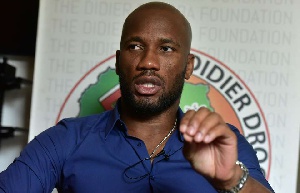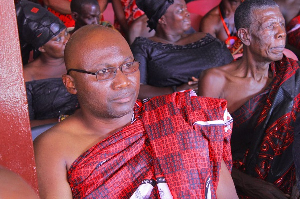Opinions of Friday, 7 November 2014
Columnist: Asare, Kwaku S.
The Speaker and Chief Justice owe the Nation an Explanation
S. Kwaku Asare
The Constitution provides at Article 60, sub-articles (11) and (12) that:
“(11) Where the President and the Vice-President are both unable to perform the functions of the President, the Speaker of Parliament shall perform those functions until the President or the Vice-President is able to perform those functions or a new President assumes office, as the case may be.” “(12) The Speaker shall, before commencing to perform the functions of the President under clause (11) of this article, take and subscribe the oath set out in relation to the office of President.”
Furtherance to Article 60(12), the Chief Justice is obliged to administer the Presidential oath to the Speaker whenever the President and Vice President are unable to perform the functions of the President. It is also clear from Article 60(11) that the Speaker’s warrant to perform the functions of the President expires when either the President or Vice-President is able to perform those functions. Because there is no such thing as a permanent Acting president, the Speaker is required to take and subscribe the Article 60(12) oath as many times as he has to perform the functions of the President under Article 60 (11). Without taking the oath under Article 60(12), the speaker cannot perform the functions of the President.
In Asare v Attorney General [2003-4] SCGLR 823, the Supreme Court held that “the purposive interpretation to be given to Article 60(11) is that where both the President and the Vice-President are absent from Ghana, they are to be regarded as unable to perform the functions of the President and thus the Speaker is obliged to perform those functions.”
Thus, when President Mahama was in Burkina Faso and Vice-President Amissah-Arthur was in India, both performing official functions, the Constitution, as interpreted by the Supreme Court, deemed them unable to perform their functions. In turn, this required the Chief Justice to administer the oath to the Speaker to allow him to perform the functions of the President, as stipulated by Article 60(11)-(12).
In clear and material violation of the Constitution, the Chief Justice did not administer the oath required by Article 60 (12) and the Speaker could not perform the functions required of him under Article 60(11). In consequence, there was no President of Ghana on Wednesday, November 5, 2014, a situation that is strictly forbidden by the Constitution, as clearly and elegantly explained by the Supreme Court in the Asare case.
The Chief Justice is the head of the Judiciary and the Speaker is the head of the Legislature. It is extremely serious, bordering on high crime, and a clear violation of their oaths of office to violate the Constitution. Both persons owe the nation a, quick, official and detailed explanation of their actions on November 5, 2014 to avoid a constitutional crisis.













